Ramadan: A Divine Union with the Quran
From Allah's wisdom, mercy, and kindness towards His servants, He has prepared for them, seasons of obedience during which their hearts expand to perform good deeds and seize opportunities. He has promised them abundant rewards for that. "And your Lord creates what He wills and chooses" (Surah Al-Qasas, 28:68).
He chose from among the people Muhammad, peace be upon him, and from the lands, Mecca and Medina, which Allah honoured. He chose from the days, the Day of Sacrifice (Al-Adha), and from the nights, the Night of Decree (lailathul Qadr), which is better than a thousand months, and from the months, the month of Ramadan, in which the Quran was revealed.
Imam Ahmad and An-Nasa'i narrated from Abu Huraira, may Allah be pleased with him, that the Prophet, peace be upon him, used to give glad tidings to his companions, saying: "Ramadan has come to you, a blessed month. Allah has prescribed fasting for you during it, the gates of Paradise are opened, the gates of Hell are closed, and the devils are chained. In it is a night better than a thousand months. Whoever is deprived of its goodness is truly deprived."
Ramadan, the noble month, has a special connection with the Quran. Allah has preferred it over all other months and distinguished it by the descent of the greatest miracles. As Allah says, "The month of Ramadan [is that] in which was revealed the Quran" (Surah Al-Baqarah, 2:185). And the Prophet, peace be upon him, said: "The Quran was revealed on the twenty-fourth night of Ramadan." [Narrated by Ahmad]. Thus, Ramadan became associated with the Quran, making it the month of the great Quran.
In this blessed month, various acts of worship converge, with those related to the Quran holding a special significance: recitation, contemplation, study, and night prayers. It's only fitting, for Ramadan is the month of the Quran, where its revelation commenced. Allah declares, "The month of Ramadan [is that] in which was revealed the Quran, a guidance for the people and clear proofs of guidance and criterion" (Surah Al-Baqarah, 2:185), and He emphasizes, "Indeed, We sent it down during a blessed night" (Surah Ad-Dukhan, 44:3). Thus, Ramadan stands uniquely as the month of the Quran.
It's as though Allah ordained fasting during this month as a token of gratitude for the bestowal of the noble Quran upon us. Fasting, among the most extraordinary acts of worship, elevates a Muslim's soul to the highest realms, akin to a personal ascension to receive the Quran in a manner distinct from other times. Hence, those who fast discover in Ramadan a profound connection with the Quran unmatched by any other period.
Ramadan serves as a prime opportunity to rectify and invigorate our bond with the Quran. It's a time of abundant blessings, where Allah magnifies rewards, sanctifies actions, restrains the influence of malevolent forces, and ushers forth spiritual opportunities. In a Hadith, the Prophet, peace be upon him, affirms, "Fasting and the Quran will intercede for the servant on the Day of Judgment. Fasting will plead, 'O Lord, I withheld him from food and desire by day, so accept my intercession for him,' and the Quran will plead, 'I prevented him from sleep by night, so accept my intercession for him.' Their intercession will be granted." [Narrated by Ahmad].
Reflecting on the connection between Ramadan and the Quran unveils fasting's role in preparing the soul for Quranic reception. During fasting, the soul finds serenity through abstaining from food indulgence. This abstinence aids in pondering and understanding the Quran by minimizing distractions, from food and drink to socializing, from desires to sight and speech. As these barriers wane, Ramadan, with its reduced indulgences, emerges as the Quran's month.
The profound impact of the Noble Quran on hearts is evident, as Allah states, "Allah has sent down the most beautiful of all teachings: a Scripture that is consistent and draws comparisons; that causes the skins of those in awe of their Lord to shiver. Then their skins and their hearts soften at the mention of Allah: such is Allah's guidance. He guides with it whoever He will; no one can guide those Allaheaves to stray." (Surah Az-Zumar, 39:23). Thus, our aspirations find fulfilment through the Quran, with Ramadan being its special season.
Hence, it's imperative for Muslims to keep the Quran close throughout Ramadan: reciting it in prayers, studying its chapters, and listening to it during Taraweeh and Tahajjud prayers. Our focus shouldn't solely be on completing Quranic recitations but on internal transformation: affecting our hearts, shedding tears, rectifying actions, and refining behaviour. This necessitates deliberate reading, contemplation, and the utilization of intellect to grasp the Quran's guidance and illuminate our path.
When it is established that Ramadan is the month of fasting and the Quran together, the intention is not that reading and pondering the Quran should only occur in Ramadan but rather that the invitation to recite and contemplate it becomes stronger and more pronounced in this blessed month.
Reflecting on Muslims' relationship with the Quran reveals a spectrum of attitudes, often indicating neglect and detachment, which doesn't befit its stature in the Ummah and the hearts of believers. Contrasting the current state with that of the righteous predecessors underscores a stark contrast, elucidating the root of our stagnation and vulnerability and the challenges confronting the Ummah due to this negligence. Simultaneously, it delineates the path to navigate through these bewildering trials.
In a Hadith narrated by Ali, may Allah be pleased with him, the Prophet, peace be upon him, foretold trials and tribulations and prescribed the remedy. He said: "Behold, there will be Fitnah (trials and tribulations), so I asked: 'O Messenger of Allah, what is the way out of them?' He said: 'The Book of Allah, Blessed and Exalted, it contains the news of those before you, the news of what comes after you, and the rulings between you. It is the decisive word, not to be trifled with. Whoever abandons it, Allah will break him; and whoever seeks guidance elsewhere, Allah will lead him astray. It is Allah's firm rope, clear light, wise reminder, and the straight path. By it, desires are not deviated, tongues are not confused, opinions are not diverged, scholars are never satiated with it, the pious never tire of it, and it does not become obsolete due to extensive refutations. Its wonders never cease. When the jinn heard it, they said, 'Indeed, we have heard an amazing Quran.' Whoever possesses knowledge through it has surpassed others, whoever speaks by it speaks the truth, whoever judges by it is just, whoever acts upon it will be rewarded, and whoever calls to it will be guided to the straight path." [Narrated by At-Tirmidhi and Ad-Darimi].
One of the guidance of Prophet Muhammad (peace be upon him) during Ramadan was to prolong the recitation in the night prayers, especially in the Taraweeh prayers. It's narrated by Imam Ahmad from Hudhaifah (may Allah be pleased with him) that he said: "I came to the Prophet (peace be upon him) one night in Ramadan and he was praying. When he said the takbeer, he said: 'Allahu Akbar, Possessor of Sovereignty, Majesty, and Honor, and Greatness.' Then he recited Al-Baqarah, then An-Nisa', then Ali' Imran. He did not pass by any verse that mentioned punishment but he stopped by it. Then he bowed (rukua') and said: 'Subhana Rabbiyal-Azim (Glory is to my Lord, the Most Great), as much as he had recited. Then he raised his head and said: 'Sami'a Allahu liman hamidah (Allah hears those who praise Him), our Lord, to You be the praise, as much as he had recited. Then he prostrated and said: 'Subhana Rabbiyal-A'la (Glory is to my Lord, the Most High), as much as he had recited. Then he raised his head and said: 'Rabbi ighfir li (O Lord, forgive me), as much as he had recited. Then he prostrated and said: 'Subhana Rabbiyal-A'la (Glory is to my Lord, the Most High), as much as he had recited. Then he raised his head and stood up, and he did not pray more than two Rak'ahs until Bilal came and called the Adhan for the prayer." [Narrated by Ahmad]
In another Hadith narrated by Ibn Abbas (may Allah be pleased with them), he said: "The Prophet (peace be upon him) was the most generous of people, and he was most generous during Ramadan when Jibril met him. Jibril used to meet him every night of Ramadan and recite the Quran with him." Ibn Rajab commented on this: "This Hadith indicates the studying the Quran in Ramadan, and gathering for that purpose is recommended. It also indicates the reciting the Quran abundantly in the month of Ramadan."
It's evident from these Hadiths that the Prophet Muhammad (peace be upon him) would extensively engage in reciting and studying the Quran during Ramadan, and he encouraged others to do the same. Therefore, the Muslim community should strive to emulate this practice, especially during Ramadan when the nights are conducive for uninterrupted reflection and contemplation, as the distractions of the day are minimized. This emphasizes the importance of Taraweeh prayers, during which the Quran is recited abundantly, offering an opportunity for believers to listen to the Quran from proficient reciters, softening their hearts and inspiring them to act upon its teachings.
Moreover, Ramadan presents a unique opportunity for believers to engage in self-discipline and spiritual exertion, fasting during the day and additional prayers at night. Those who successfully combine both aspects of worship, fulfilling their rights with patience and perseverance, will be rewarded abundantly by Allah, as mentioned in the Quran: "Indeed, the patient will be given their reward without account." (Quran, Surah Az-Zumar, 39:10).
(Prepared by Faisal Niyaz Hudawi based on an Article published in Arabic in Islamweb.net https://www.islamweb.net/ar/article/239998/%D8%B9%D9%84%D8%A7%D9%82%D8%A9-%D8%A7%D9%84%D9%82%D8%B1%D8%A2%D9%86-%D8%A8%D8%B4%D9%87%D8%B1-%D8%B1%D9%85%D8%B6%D8%A7%D9%86)
Disclaimer
The views expressed in this article are the author’s own and do not necessarily mirror Islamonweb’s editorial stance.

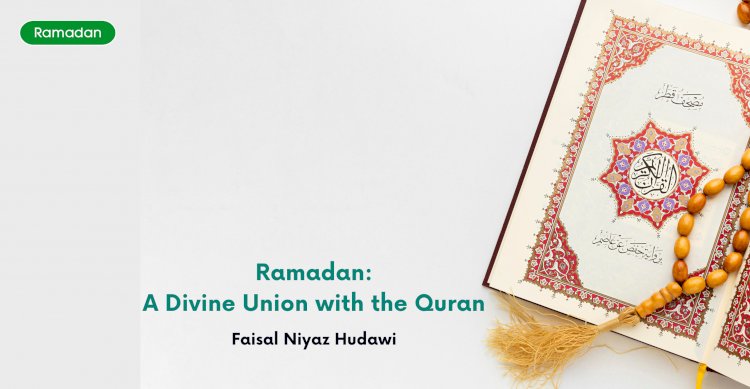


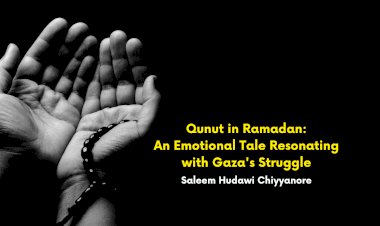

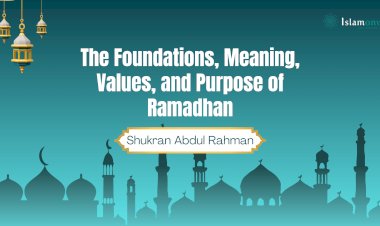
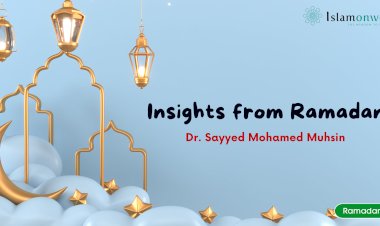
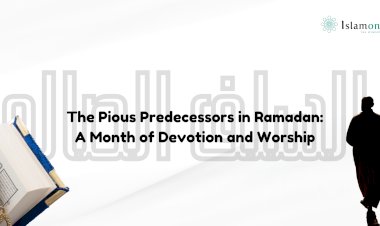















Leave A Comment